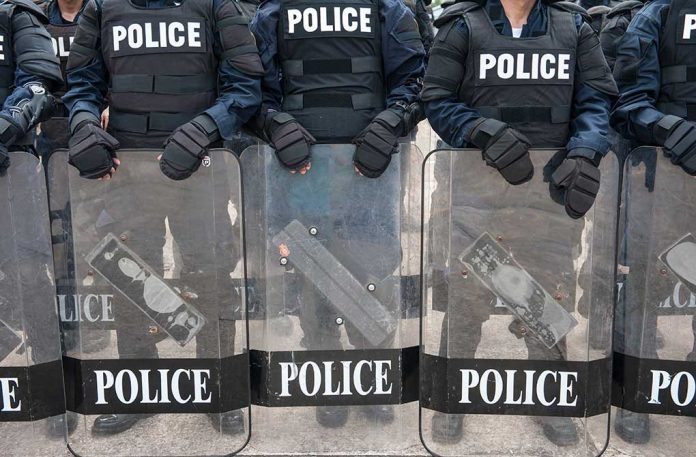
Florida drivers threatened by mobs of protesters can now legally flee for safety without liability for any injuries caused to those blocking roadways, Governor Ron DeSantis affirmed in his latest statement reinforcing the state’s zero-tolerance policy toward riots.
Key Takeaways
- Governor DeSantis has emphasized that Florida drivers have the right to flee for safety if threatened by mobs surrounding their vehicles, without being liable if protesters are injured.
- Florida maintains a clear distinction between constitutionally protected peaceful protests and illegal activities like riots, roadway blockages, and violence.
- Unlike California, Florida law enforcement quickly disperses demonstrations that block roadways or threaten to become violent.
- The state’s “Combating Public Disorder Act” includes enhanced penalties for violent or disorderly assemblies, reflecting Florida’s strict approach to maintaining public order.
- DeSantis contrasts Florida’s firm stance with more permissive approaches in states like California, which he claims effectively side with those causing unrest.
Florida’s Self-Defense Laws Protect Drivers from Mob Violence
Governor Ron DeSantis has reinforced Florida’s commitment to protecting its citizens from mob violence, particularly in situations where protesters surround vehicles on public roadways. In a recent appearance on “The Rubin Report,” DeSantis clarified the state’s policy regarding drivers who find themselves threatened by crowds of protesters. His statements come amid nationwide protests against immigration enforcement actions, which have turned violent in some locations outside Florida.
“If you’re driving on one of those streets and a mob comes and surrounds your vehicle and threatens you, you have a right to flee for your safety, and so if you drive off and you hit one of these people, that’s their fault for impinging on you. You don’t have to sit there and just be a sitting duck and let the mob grab you out of your car and drag you through the streets,” stated Governor Ron DeSantis during his interview.
DeSantis further emphasized, “You have a right to defend yourself in Florida.” This statement aligns with Florida’s broader self-defense laws and the state’s approach to handling civil unrest. Unlike some other states where drivers have faced prosecution after attempting to escape threatening protest situations, Florida’s policy clearly prioritizes the safety of law-abiding citizens over those engaging in illegal roadway blockages.
Zero Tolerance for Roadway Blockages and Civil Unrest
Florida’s approach to handling protests stands in stark contrast to states like California, where recent anti-ICE demonstrations have resulted in significant disruptions and property damage. Governor DeSantis has been clear that while Floridians have every right to exercise their First Amendment freedoms, crossing the line into disruptive or violent behavior will not be tolerated. The governor highlighted that law enforcement in Florida acts swiftly to disperse any gatherings that impede traffic or threaten public safety.
“You have no right to commandeer streets. First of all, it’s just wrong; second of all, that has huge impacts on people’s quality of life,” said Governor Ron DeSantis, emphasizing the practical consequences of allowing protesters to block roadways.
The governor’s office has pointed to Florida’s “Combating Public Disorder Act,” which strengthens penalties for those engaging in violent assemblies and provides legal protections for citizens defending themselves against mob violence. This legislation, enacted in 2021, represents a cornerstone of Florida’s strategy to maintain public order while respecting legitimate free speech rights.
Florida vs. California: Contrasting Approaches to Civil Disorder
Governor DeSantis has explicitly compared Florida’s handling of civil unrest with that of California, suggesting that authorities in the Golden State effectively enable disruptive behavior through permissive policies. The contrast is particularly evident in the response to recent anti-ICE protests, which have been largely contained and orderly in Florida while escalating to significant unrest in California cities.
“In terms of the unrest, Florida’s policy is very simple: You have every right to exercise your First Amendment rights to protest and demonstrate. The minute you cross that line, you are going to be met with serious pushback, and you will be held accountable. We do not tolerate rioting; we do not tolerate civil unrest; we do not tolerate looting; we do not tolerate attacks on law enforcement,” stated Ron DeSantis, outlining Florida’s clear boundaries for public demonstrations.
DeSantis attributes the difference to California’s sanctuary state policies, which he believes have fostered a sense of entitlement among those who oppose federal immigration enforcement. By contrast, Florida’s consistent enforcement of all laws, including those pertaining to public disorder, has created an environment where protesters understand the clear boundaries of acceptable behavior.
Effective Enforcement and Public Safety Results
The practical results of Florida’s approach are evident in how recent demonstrations have unfolded in the state. While other parts of the country have experienced violent clashes between protesters and authorities, Florida has seen mostly peaceful demonstrations that remain within legal boundaries. When attempts at more disruptive protests have occurred, law enforcement has responded quickly to maintain order.
“And so I know they’re planning stuff for all over the country; they tried to do a little protest in Florida, and they actually just held signs, which is fine, but that’s as far as it goes here. I think the problem in places like California is the authorities at both the local and state level; they’re effectively siding with the people that are causing the unrest,” explained Ron DeSantis, pointing to the effectiveness of Florida’s clear boundaries and consistent enforcement.
This approach has allowed Florida to balance the protection of First Amendment rights with the maintenance of public safety and order. By establishing clear consequences for crossing the line from peaceful protest to disruptive or violent behavior, Florida has created an environment where legitimate expression can occur without the chaos seen in some other states.







